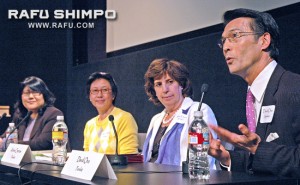BCC Member Davi Cheng on Panel Discussion
The following is an article by journalist Mikey Hirano Culross posted June 18, 2009 on Rafu Shimpo, the Los Angeles Japanese Daily News. This piece covers a discussion panel held Thursday, June 11, 2009 on “The Shifting Attitudes on Multicultural Families and Intermarriage” at the National Center for the Preservation of Democracy which included, Grace Yoo, BCC Member Davi Cheng (pictured above in yellow sweater), Arlene Chernow and David Ono. Go to www.Rafu.com
Identity and Inclusion
A forum at the Democracy Center invites discussion of mixed-race experience and forging partnerships.
By MIKEY HIRANO CULROSS
RAFU STAFF WRITER
Changing attitudes on multicultural families and intermarriage was the topic Thursday evening at the National Center for the Preservation of Democracy in Little Tokyo, during a forum organized by the Asian Jewish Initiative.
The event, whose sponsors included the Anti-Defamation League and the Asian Pacific American Legal Center, had the stated goal of helping to advance partnerships between the Asian and Jewish communities, yet broadened its approach to include discussions of multicultural identity struggles and the question of gay and lesbian participation in Judaism.
The evening was highlighted by a spirited presentation by artist Kip Fulbeck, author “Part Asian, 100% Hapa,” among other titles.
After opening with a one-man sketch in which he is interviewing for a job and forced to identify himself within a single ethnic group, Fulbeck related some of his experiences of being of mixed race and the challenges he has faced.
“It was only nine years ago that the U.S. Census allowed residents to check more than one box relating to race,” Fulbeck noted, adding that his parents were married before the repeal of anti-miscegenation laws that forbade mixed-race couples from being married.
“For kids, they had to choose the race of either their mother or father, and that’s a hard thing to do for someone so young,” he said.
A discussion followed Fulbeck’s comments with a panel guests that included KABC news anchor David Ono, whose mother was Japanese.
“My mother died when I was very young, and growing up in San Antonio, Texas, I didn’t really know what it meant to be Japanese,” Ono said, recalling his childhood. “Back then, in the 70s and 80s, Texas was not very diversified.
Because I was of mixed race, people couldn’t quite figure out what I was. There was a lot of assumption that I wasn’t Hispanic, because I had dark hair.”
Ono said that it was until he relocated to California that he became more aware of how many people were embracing their multiracial heritage and sharing their stories.
“It’s been a rather remarkable learning process,” Ono said. “You can’t help but immerse yourself into these issues and learn about them and what it’s like.”
The forum had an added sense of sobriety in light of the recent killing of a doctor by an antiabortionist radical and this week’s slaying of an African American security guard by a white supremacist at the Holocaust Museum in Washington D.C.
Davi Cheng, Hong Kong-born vice president of the Union of Reform Judaism Pacific Southwest region and L.A. director of Be’chol Lashon, was among the panelists.
“It’s a perversion of the symbols,” Cheng said referring to the killings. “This doctor was gunned down in a church. The guard was killed in a museum of tolerance.”
Cheng attended the discussion with her spouse, Bracha. The two were married last July after the California State Supreme Court struck down a law banning same-sex marriage and before the passage of Proposition 8 reinstated the ban. She said that her life has helped her to see the world in a unique way.
“As a Chinese lesbian Jew, I have the good fortune of experiencing life through many different perspectives,” she said during the discussion.





